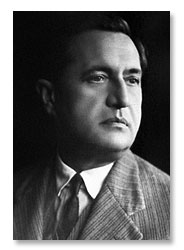Václav Talich facts for kids
Václav Talich (born May 28, 1883, died March 16, 1961) was a famous Czech musician. He started as a violinist and later became one of the greatest orchestra conductors of the 20th century. He was also a music teacher, helping many students learn about music. Today, people still listen to his many recordings.
Contents
Václav Talich's Life and Career
Václav Talich was born in a town called Kroměříž in Moravia. He began his musical journey playing in a student orchestra in Klatovy. From 1897 to 1903, he studied violin at the Prague Conservatory. His teacher was a famous violinist named Otakar Ševčík.
After his studies, Talich became the main violinist, or "concertmaster," for the Berlin Philharmonic orchestra for one year. He was so amazed by the orchestra's main conductor, Arthur Nikisch, that he decided to become a conductor himself. He then studied conducting with Nikisch in Leipzig.
Early Conducting Roles
Talich first conducted an orchestra in Tbilisi in 1906. His first official conducting job was in Ljubljana with the Slovenian Philharmonic. Later, from 1912 to 1915, he conducted operas in Plzeň. An opera is a play where the story is sung with music.
From 1915 to 1918, he played the viola for the Bohemian Quartet, which later became known as the Czech Quartet.
Leading the Czech Philharmonic
Václav Talich's most important work began on October 30, 1918, with the Czech Philharmonic orchestra. He conducted the first performance of a piece called Zrání (Ripening) by the composer Josef Suk.
From 1919 to 1941, Talich was the chief conductor of the Czech Philharmonic. He made the orchestra famous around the world. He took them on many tours and recorded a lot of Czech music.
During this time, he also worked with other orchestras. He was the chief conductor of the Scottish National Orchestra in 1926–27. He also led the Konsertföreningen Orchestra in Stockholm from 1926 to 1936.
In 1935, Talich became the chief opera director at the National Theatre in Prague. He helped make operas by Leoš Janáček more popular. Some of Janáček's works were performed for the very first time under Talich's direction. In 1944, he lost this job, and the National Theatre was closed by the Nazi government.
Post-War Challenges and New Beginnings
After World War II, Talich faced some difficulties. He was accused of working with the Germans during the war. However, these accusations were later proven to be false.
He started his career again in 1946. He created the Czech Chamber Orchestra with students from the Prague Conservatory. In 1948, the government told the orchestra to get a different conductor or stop playing. The orchestra chose to stop.
Talich then founded the Slovak Philharmonic orchestra in Bratislava. He conducted this orchestra until 1952. He was also able to work with the Czech Philharmonic again. He gave his last public performance with them in November 1954. He continued to make recordings and broadcasts until 1956. In 1957, he received the highest honor in Czechoslovakia, becoming a "national artist."
Musical Legacy and Teaching
Václav Talich was especially known for how he conducted music by Czech composers. He was excellent at performing works by Antonín Dvořák, Bedřich Smetana, and Josef Suk. He also played a big part in making the operas of Leoš Janáček well-known.
Talich was also a dedicated teacher. Many of his students became famous conductors themselves. Some of his pupils included Karel Ančerl, Charles Mackerras, and Ladislav Slovák.
Later Life and Honors
From 1936, Václav Talich lived part-time in Beroun. He passed away there in 1961 at the age of 77.
To honor him, an elementary art school in Beroun was named after him. Also, a music festival called "Talich's Beroun music festival" is held every year since 1983, celebrating his contributions to music.
Images for kids
See also
 In Spanish: Václav Talich para niños
In Spanish: Václav Talich para niños
 | Precious Adams |
 | Lauren Anderson |
 | Janet Collins |



